Christ is risen! Truly he is risen!
The Church Fathers did nothing haphazardly. During Pascha, as our lectionary takes us through the Gospel of John, * the Fathers selected particular Sunday readings for a reason. This week we get a very clear moral lesson from these holy men and women who ministered to the Lord after his death. In the following weeks we will hear, in symbol, how Christ works with us for our salvation.
- Please follow along day by day. Try: 1 https://www.goarch.org/chapel/ 2 http://www.antiochian.org/liturgicday
Gospel: Mark 15:43-16:8
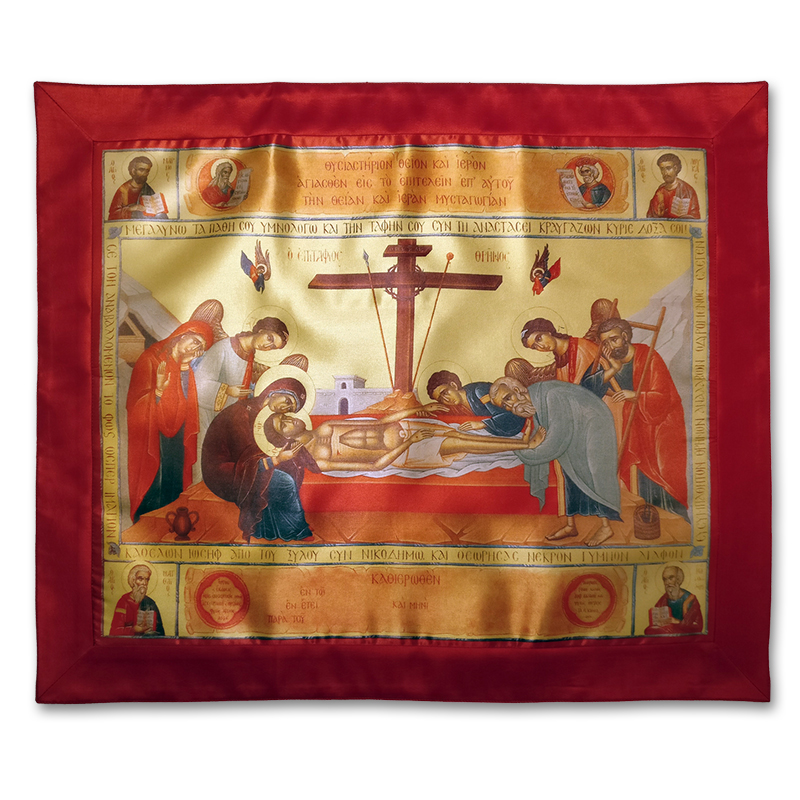 The image of these saints is on the Epitaphion, which you read about in the Holy Friday Post of two weeks ago. During the forty days of Pascha, this is placed on the altar, and the Holy Gifts are consecrated on it. Even during the rest of the year the Gifts are blessed on the same image – a cloth called the Antimension, on which is the signature of the local Bishop, Metropolitan or Archbishop, which authorizes that parish to celebrate the Divine Liturgy. Out of the Death of our Lord and God and Savior Jesus Christ comes new Life, eternal Life for all.
The image of these saints is on the Epitaphion, which you read about in the Holy Friday Post of two weeks ago. During the forty days of Pascha, this is placed on the altar, and the Holy Gifts are consecrated on it. Even during the rest of the year the Gifts are blessed on the same image – a cloth called the Antimension, on which is the signature of the local Bishop, Metropolitan or Archbishop, which authorizes that parish to celebrate the Divine Liturgy. Out of the Death of our Lord and God and Savior Jesus Christ comes new Life, eternal Life for all.
+ + + + + + +
Do you know the stories of these wonderful saints?
Saint Joseph of Arimathea
Arimathea was a suburb of Jerusalem. Matthew 27:58 says that Joseph bravely went to Pilate and asked for the body of Jesus and laid it in a tomb which he had intended for his family – as Jesus possibly was; read on. It was a cave, since there isn’t much soil for burial around there. Note the double symbolism: Both at Christ’s Birth and at his Resurrection new Life for the world came forth from the darkness of a cave.
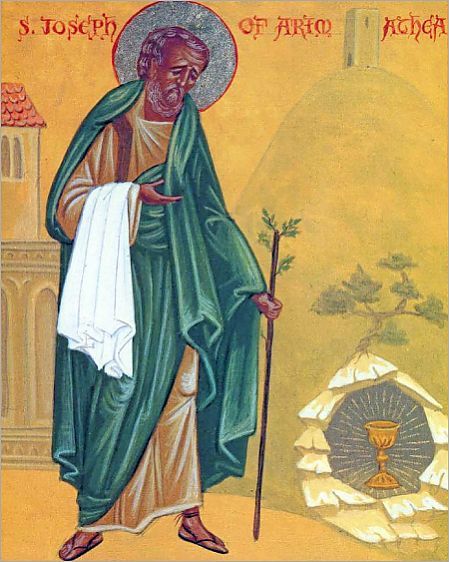
Joseph was a wealthy member of the Jewish high council the Sanhedrin which had condemned Jesus to death on Holy Friday morning – “a good and righteous man, who had not consented to their decision or action.” He was from the Judean town of Arimathea, “and was waiting for the kingdom of God.” Luke 23:50-51 – “a rich man …who had himself become a disciple of Jesus.” Matthew 27:57. That’s all the Scriptures tell about him.
Tradition in both East and West says that after the Resurrection Joseph was expelled from the Sanhedrin, fled Jerusalem and went to England. A British story goes on to say that Joseph was uncle of the Virgin Mary, that he had made his money trading tin between the mines of Cornwall and the Middle East, and that on one voyage to England he had taken the boy Jesus along with him.
This was the inspiration for the hymn above, by William Blake (d. 1827), a mystic who thought the industrial revolution with its “dark Satanic mills” was destroying England, and maybe it did. It is sung at almost every national event – a lovely hymn, but I wonder how many Brits today, in their post-Christian era, have any idea what it’s all about.
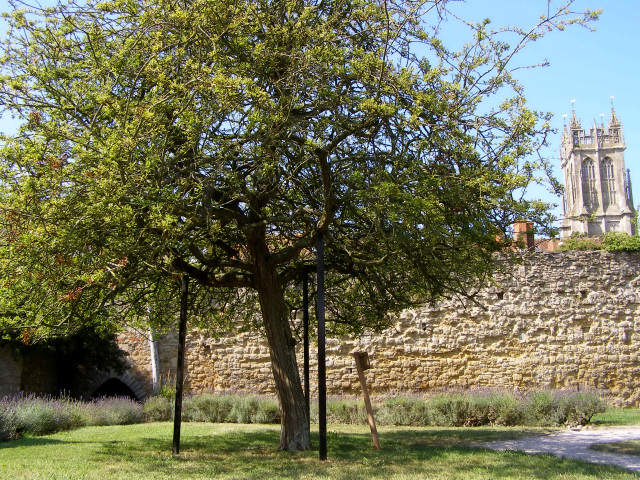
British tradition says Joseph had trouble with a druid chieftain and so fled to southwest England to a place called Glastonbury, which became the first Christian settlement in Britain. An ancient thorn bush grew there (Khouria Danna and I saw it) said to be descended from the crown of thorns which Joseph removed from the Lord’s head. The Glastonbury bush died in 1991. I wonder if it was because by then Glastonbury had become a New Age center. The French, however, say the real crown of thorns is in Notre Dame Cathedral and escaped the recent fire. A later and dubious legend says Joseph also brought the Holy Grail (the cup from the Last Supper) to England, the quest for which was the principle occupation of King Arthur and his knights. But who knows?
Joseph died in England far from homeland and family, and his relics were venerated at Glastonbury, apparently till Henry VIII destroyed them.
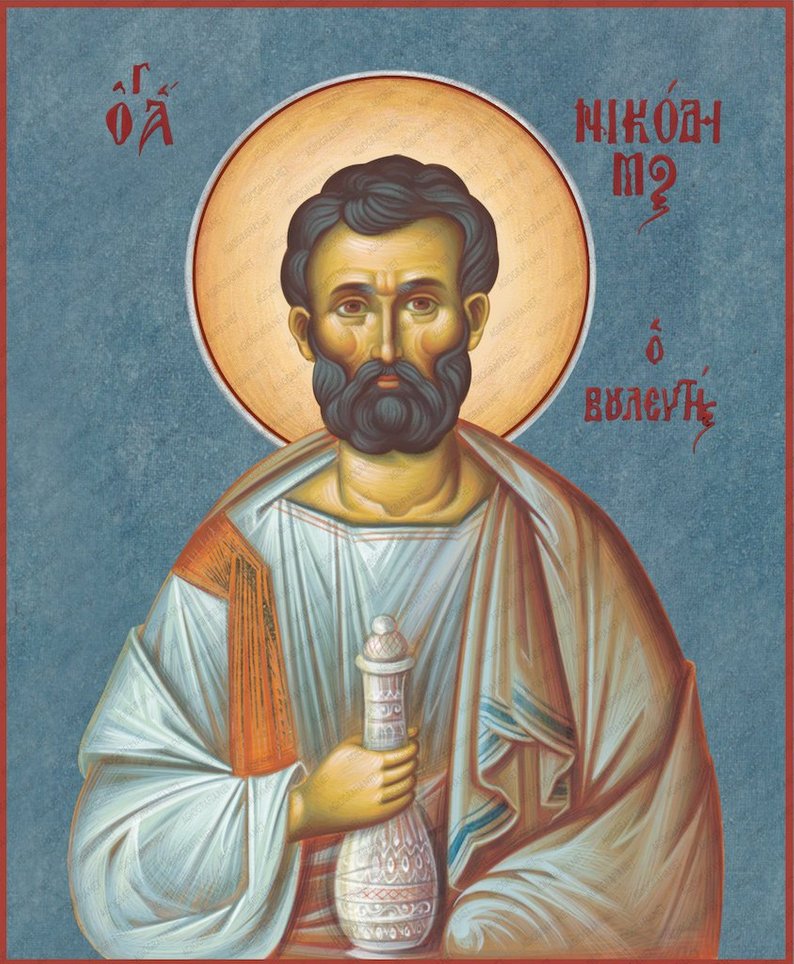 Nicodemos
Nicodemos
All we know about his background is that John says he was a Pharisee and a “ruler of the Jews”, presumably a member of the Sanhedrin. It was he who early in Jesus’ ministry went to him by night (obviously afraid of being seen) seeking truth. It was to Nicodemos that Christ said “You must be born again of water and the Spirit” – that is, Baptism and Chrismation. John 3 * When the Pharisees condemned Jesus, Nicodemos objected: “Does our law condemn a man without first hearing him to find out what he has been doing?”John 7:51 After he assisted with Christ’s burial, it is said he was martyred by the Jews. We have no details, but John writes as if Nicodemos was someone known to his readers.
- In the New Testament, being born again – “new birth”, “rebirth”, “regeneration” – consistently refers not to a religious experience but to Baptism. We can also have later moments of spiritual renewal which are a very good thing, but we are born into eternal life once – in Holy Baptism.
The Holy Myrrhbearing Women
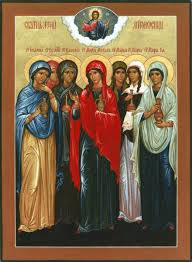 Mark names only three: Mary Magdalene, Mary the mother of Joses, and Salome. Luke adds Joanna. Both accounts say there were others. Tradition adds Mary, Martha and Susanna to make seven. Many accounts add an eighth, Mary the wife of Cleopas. This icon in our kitchen at home has seven.
Mark names only three: Mary Magdalene, Mary the mother of Joses, and Salome. Luke adds Joanna. Both accounts say there were others. Tradition adds Mary, Martha and Susanna to make seven. Many accounts add an eighth, Mary the wife of Cleopas. This icon in our kitchen at home has seven.
1 Mary Magdalene (from Magdala near the sea of Galilee) is best known. She had followed Jesus since early in his ministry. Christ had healed her of seven demons, which was a way of saying she had had big problems. Western Christians claim she had been a prostitute, but nothing in the Bible or ancient tradition says this. John says she was first to arrive at the tomb and meet the risen Lord. This is one of our eleven Matins Resurrection Gospels – read on a rotating cycle, one each Sunday.
Mary remained in Gethsemane and through her tears saw someone she took to be the gardener, till he turned and said to her “Mary”. Mary ran and told the Apostles, “I have seen the Lord!” Every time we read this story I get the holy chills- it is so full of wonder and joy. (Brothers and sisters, I know hardly anybody is going to do this! but please, pleases come to Sunday Matins, at least in time for the Resurrection Gospel.)
Orthodox title Mary “Isapostolos”, ἰσαπόστολος, “Equal to the Apostles”, the first to proclaim the Resurrection. Legend says she later went to Rome and gave Tiberius Caesar a red egg, saying “Christ is risen!” – presumably the origin of our distributing red eggs at Pascha – and that later she lived in Ephesus near John the Theologian and the Lord’s Mother. Some French say she later went to France, but I don’t think so. She has her own feast day, July 22. The Davinci Code has long blown over now, but just in case: She was not married to Jesus! Honestly, where do these off-the-wall notions come from?!
2 Salome wife of Zebedee the fisherman, mother of the apostles James and John. Tradition says she was cousin of the Virgin Mary, making young John the Beloved Disciple Jesus’ second cousin (I think?), which would explain why they were so close.
3 Joanna wife of Chuza, Herod’s steward. It was she who rescued the head of John the Baptist and later assisted the apostles in Jerusalem.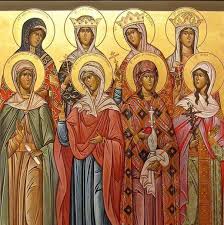
4 Susanna, known only as a friend of Mary Magdalene.
5 and 6 Mary and Martha whom you know – sisters of Lazarus, friends of the Lord Jesus, at whose home in Bethany he stayed when he was in the Jerusalem area – especially during Holy Week.
7 Mary mother of James and Joses. Some say she was wife of Cleopas. Others says she was not, which would make:
8 Mary the wife of Cleopas, who along with Luke walked unknowing with the risen Lord on the road to Emmaus on Pascha night.
I hope I’ve kept this all straight.
Why did these Blessed Ones perform this act of charity?
For us who know Christ is risen, it is hard to remember how utterly despairing and despondent all these people felt as they cared for the Body of Jesus. Remember the sweet but mournful hymn from Holy Friday: “Noble Joseph, taking down Thy most pure Body from the Tree, wrapped it in clean linen, anointed it with spices, and laid it in a new tomb.” And that, they thought, was the end of the song.
But on this Third Sunday we sing it again, now adding a verse: “But on the third day thou didst arise, O Lord, granting great mercy to the world.”
However, when Joseph asked for the Lord’s Body there was nothing he could possibly expect out of this act of mercy except trouble. There could be no reward from a corpse. He had lost hope, now, that this Man had been the Messiah. His fellow members of the Sanhedrin were already greatly suspicious of Joseph for his disloyalty – why had he not adhered to the party line? why had he not voted to condemn Jesus? Joseph had much to lose by claiming the Body of this Man whom the Romans had executed for treason and whom the Jews had condemned to death for blasphemy.
So why did he do it? The Gospel account doesn’t tell us – but my guess is that it was more than simply an act of charity. I suspect Joseph was also trying to redeem his virtue. Though he had quietly not voted to condemn Jesus, 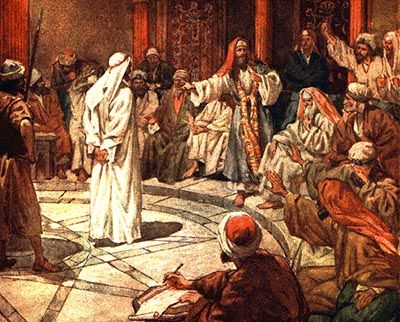 surely he was now saying to himself: If only I had spoken up, tried harder to stop this. He knew first hand how unjustly the Sanhedrin had condemned this innocent Man, and how utterly blasphemous (they were the blasphemers!) when they sold out to Rome, crying to Pilate “We have no king but Caesar”. Those frauds. Likewise, Pilate knew Jesus was innocent. “But what wrong has he done?” he had cried. “I find no fault in him” – and then how Pilate had literally washed his hands of the matter, and sacrificed his conscience and condemned this innocent Man to death – all in order to save his career. It was enough to make Joseph want to wash himself in lye soap.
surely he was now saying to himself: If only I had spoken up, tried harder to stop this. He knew first hand how unjustly the Sanhedrin had condemned this innocent Man, and how utterly blasphemous (they were the blasphemers!) when they sold out to Rome, crying to Pilate “We have no king but Caesar”. Those frauds. Likewise, Pilate knew Jesus was innocent. “But what wrong has he done?” he had cried. “I find no fault in him” – and then how Pilate had literally washed his hands of the matter, and sacrificed his conscience and condemned this innocent Man to death – all in order to save his career. It was enough to make Joseph want to wash himself in lye soap.
So my guess is that Joseph’s conscience said to him: That’s it. That’s as far as I go! I may lose it all, but I’ve got to do something to prove that I’m not one of “them”, those hypocrites pretending to be holy religious leaders, that self-seeking politician who cares only for himself. And so in order to try to become an honest man, to redeem his “character”, Joseph acted now in a way the whole world would see. He went and asked for the Body of Jesus.
Never imagining what would come of it: Christ risen from the dead! And that twenty centuries later it would be from Joseph’s own tomb that the Holy Fire
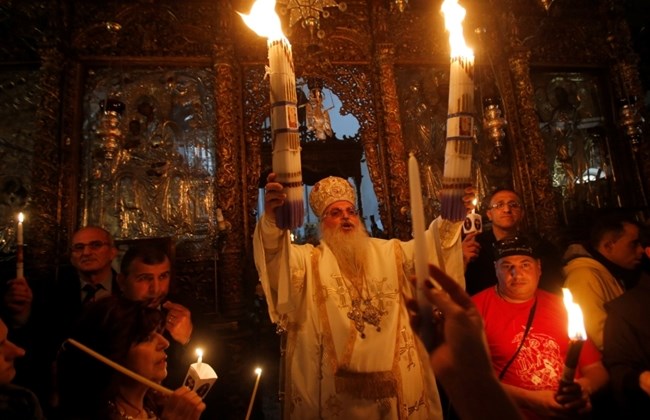 miraculously appears every Pascha. And that every Pascha in 100,000 Orthodox churches and monasteries all around the world, priests would come out from the altar as if from Joseph’s tomb chanting, “Come, take light from the Light that is never overtaken by night”. And that an image of Joseph himself would lie upon the altar of every Orthodox Church in the world. All from this one act of repentance and charity.
miraculously appears every Pascha. And that every Pascha in 100,000 Orthodox churches and monasteries all around the world, priests would come out from the altar as if from Joseph’s tomb chanting, “Come, take light from the Light that is never overtaken by night”. And that an image of Joseph himself would lie upon the altar of every Orthodox Church in the world. All from this one act of repentance and charity.
Why did the Holy Myrrbearers anoint the Body of Jesus? This is simpler: Duty. They likewise had no expectation of what was about to happen to them. But women anointing the 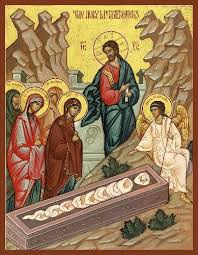 bodies of the dead in those days, and they hadn’t completed it on the eve of the Sabbath when such things couldn’t be done. But it had to be done, so as soon as they could they went to do it. Duty. And so they met Christ risen from the dead.
bodies of the dead in those days, and they hadn’t completed it on the eve of the Sabbath when such things couldn’t be done. But it had to be done, so as soon as they could they went to do it. Duty. And so they met Christ risen from the dead.
Nor could they ever have imagined that 2000 years later the image of them ministering to a dead Man also would lie on the altars of every Orthodox church and monastery in the world, whereon has been celebrated every Divine Liturgy, millions of them by now, honoring their place in the life-giving Death and Resurrection of our Lord and God and Savior Jesus Christ.
The Moral of the Story
This is simple:
1 Like Joseph, do what is right, not counting the cost. Don’t cooperate with the rats. Keep your conscience clear.
2 Like the Myrrhbearers, do your duty. Do what you ought to do, even when it’s hard – hard to be faithful to your Lord, to your Church, to your spouse, to your family, to your principles, to your Faith.
3 Like all of them, never fail to practice charity, especially towards the poor and abandoned. Jesus was once one of these, wasn’t he? In fact he told us that he still is, and when we minister to them we minister to him.
That’s it. It’s simple. But not easy.
For when you do these things, you never know what wonderful, life-giving, world shaking things might come of it!
However, you do know something quieter that will definitely come of it: You will know the living Christ for yourself. “He who has my commandments and keeps them, it is he who loves me. And he who loves me will be loved by my Father, and I will love him and manifest myself to him… and we will come to him and make our home with him.” John 23:21,23
![]()
For Christ is risen! Truly he is risen!
Next Week: The Paralytic – how Christ raises us up
Week after Next: The Samaritan Woman – how Christ leads us on

Very good as always dear Father, I have a great regard for your Blog, indeed, I love your Blog and refreshing style but regarding William Blake’s poem, set to music by Hubert Parry and know as “Jerusalem.” This “Brit” cannot let your comment pass without one of my own.
Blake regarded himself a Christian but he was not a conventional one and was opposed to most forms of organised religion and he certainly detested the Church of England and any establishment or “orthodox” church. He did not have any time for priests and no doubt that would have included the real Orthodox Church and its Priests.
The “Satanic Mills” may well have been also the industrial building of his time but to Blake, establishment church buildings and specially the Universities of Oxford and Cambridge, where most Anglican Clergy were (sort of) trained/educated, were his “Satanic Mills.” In my former life as an Anglican Priest, I only once permitted “Jerusalem” to be sung (a favour to a lovely lady) and was often amused to see staunch establishment figures sing it with great gusto.
Perhaps not entirely accurate but some good articles on Wikipedia and other sites.
Monk Serbàn
Thank you, Monk Serban. I should have mentioned that Blake was only vaguely Christian, but then I think so was much of the Church of England at that time. I never heard Anglicans sing the hymn here in America, so I finally read the words: Verse two doesn’t make much sense, does it? Do you know how such an off-beat hymn became the “national hymn” of England?
Perhaps the fervent hope that Joseph of Arimathea really did bring the young Jesus to Brittania Major. Many did see Blake’s words as a protest against the appalling working conditions in the Mills and other places. Perhaps a success because of Hubert Parry’s rousing music and in the 1920.s, Walford Davies’ arrangement for the English Women’s’ Institute Choirs (it became their unofficial anthem). It was also used by many involved in the struggle for women’s suffrage.
The Sword maybe a reference to Ephesians 6: “16 Above all, taking the shield of faith, wherewith ye shall be able to quench all the fiery darts of the wicked. 17 And take the helmet of salvation, and the sword of the Spirit, which is the word of God.”
I think more likely (given Blake’s dislike of organised religion) a reference to Psalm 149: “Let the praises of God be in their mouth, and a two-edged sword in their hands, to be avenged of the heathen, and to rebuke the people; to bind their kings in chains, and their nobles with links of iron, that they may be avenged of them, as it is written, Such honour have all his saints.”
Serbán
I find a lot of the traditions about St Joseph to be pretty wild, but I really want them to be true! Do you know how early those traditions are? I always assumed they were a later Roman Catholic invention.
Me too. Lovely stories. I know no more about their authenticity than what I can dig up online. I read in one place that written accounts of the stories go back only to the 12th century. One Coptic site says that the Vatican Library has an “ancient” codex telling the basic story of Joseph in England. I think it’s safest to say that these are legends passed down for many years. How many? As I said, “Who knows?” But if we were to find definite proof of almost anything we believe about the ancient world, we’d be hard pressed. Was Julius Caesar’s account of his campaign in Gaul the first reputed history? and that one was written by the “winner”, as they say.